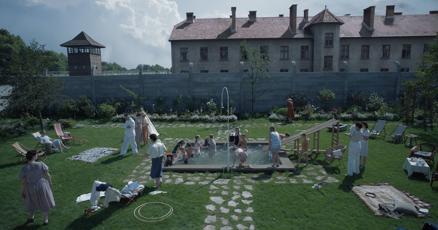In 1963, the phrase “the banality of evil” was coined by the German philosopher Hannah Arendt to depict Nazi official Adolf Eichmann, a key figure in the Holocaust who evaded accountability for the genocide of 6 million Jews by claiming he was merely following orders and carrying out his duties.
Jonathan Glazer, the British writer-director, skillfully brings this concept to life in “The Zone of Interest” by delving into the lives of Auschwitz commandant Rudolf Hoss, his wife Hedwig, and their five children during the years 1943-44. They resided in a lavish villa near the concentration camp, where countless Jews were being exterminated.
Glazer’s masterstroke lies in his decision not to depict the atrocities within the camp visually. Instead, the horrors are conveyed through Mica Levi’s jarring musical score and Johnnie Burn’s meticulously crafted sound design, featuring industrial clamor and gunshots that formed the grim backdrop for the family’s existence.
Maintaining this observational stance, Glazer and cinematographer Lukasz Zal strategically positioned ten covert cameras on the set, capturing the actors in mid-length shots from unconventional angles with minimal close-ups.
By abstaining from showcasing the inner workings of the death camp and maintaining a distance from Hoss and his family, any romanticized or sympathetic portrayals are averted, allowing Christian Friedel and Sandra Hüller to portray the mundane routines of Rudolf and Hedwig without rationalization for their amoral actions.
This approach lends poignancy to subtle moments, such as a Jewish servant cleaning blood off Rudolf’s boots or Hedwig donning a fur coat that once belonged to a deceased Jewish woman of wealth, instilling a sense of unease.
The narrative transitions in the final segment, shifting focus from Auschwitz to Berlin, where Hoss assumes a higher position as the deputy commandant of the Nazi concentration/extermination camp system, embodying the bureaucratic banality of evil. Discussions revolve around operational efficiencies, increased labor demands from prisoners, and the impending deportation of Hungarian Jews.
Friedel delivers a compelling performance, portraying the callous efficiency of camp operations and Hoss’ unchecked ambition, which blinds him to the enormity of his actions.
“The Zone of Interest” garnered five Academy Award nominations, including best picture, director, adapted screenplay (loosely based on a Martin Amis novel), sound, and international feature. While it generated belated best picture buzz, its prospects for winning the international feature Oscar appear more promising.
In the poignant final scene, Hoss rejoices over a promotion that will lead him back to Auschwitz, where he ultimately meets his fate on the gallows for the atrocities committed under his watch—a stark reminder of the banality of evil that persisted even as his family lived in apparent bliss nearby.
